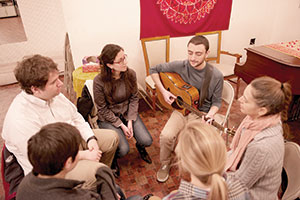 By Douglas Yu
By Douglas Yu
“Let’s go all around and say what you are thankful for, but you don’t have to say anything awkward or uncomfortable,” Benjamin Lovenheim was playing a peaceful tune with his guitar and was saying this in front a group of people who came together to share a warm and musical moment for Thanksgiving Day.
This Brandeis University student, who majors in Philosophy, led a sing-along event in Somerville to explore the unknown aspects of the holiday. In fact, Lovenheim has been doing this for almost seven years.
“I started it within a Jewish community, working with the local summer camps and youth groups.” Lovenheim said. “There is a big tradition of group singing in those communities: using guitars, using voice and singing songs together, building repertoire. And we used it for something else more than music, for some spiritual, emotional connection and for educational purposes.”
Lovenheim was trained with some professional song leaders before he first started his own song leading.
“I went to a conference where there were 150 Jewish musicians from all over the country,” Lovenheim said. “We all sang together, trained together.” He also said that his philosophy class in college gave him a lot of inspiration for his music.
Lovenheim thinks that the American holidays are highly regarded, but there is a lack of meaning when people celebrate them. He shared a story about why he ended up song leading Thanksgiving this year instead of other holidays.
“I got a called from my sister. She said that she didn’t want to celebrate Thanksgiving with our family this year,” Lovenheim said. “Because she was really turned off by the whole idea that Thanksgiving celebrates the start of the Native American genocide, which includes taking their land, moving them out, killing them all, taking their crops and food.”
Lovenheim feels, instead of deciding to not do or get rid of Thanksgiving because of its history in cheating and harming Native Americans, we should instead use the holiday as a time to reflect on the wrongdoings of ourselves as a nation and individuals, and work especially hard during the Thanksgiving time to help make right some of our wrongs and prepare ourselves to never make such mistakes again. Thanksgiving is a time to say thanks for what we have, but more importantly, it is a time to recognize those people that we have wronged, and work hard to make sure that everyone, especially including those people, has something to be thankful for.
Surrounded by Middle Eastern patterned rugs on the wall, immersed in some light and loving songs played by Lovenheim, all the attendees at the event were closing their eyes, not shy at all about sharing their thankfulness.
Some people said that they were thankful for unconditional love, some said that they were thankful for just being present after going through so many difficulties in life and others said that they were thankful for being who they are.
The group, along with Lovenheim, also enjoyed several moments of silence between the songs for people to coast and relax. “It’s good for us just to take some time to think about what we are thankful for,” Lovenheim said.
During the song-leading event, Lovenheim encouraged attendees to get rid of the comfortableness of personal space. He asked people to sit close and even closer after some songs, allowing everyone to feel the natural intimacy between human beings.
Like everyone at the event, Lovenheim has his own sense of gratitude as well.
“My friend and partner, Molly, has done so much for me this year to try to make our relationship better. We’ve been through a lot,” Lovenheim said. “She’s just wonderful.”
On a special year when the Jewish holiday Hanukkah falls on the same day of Thanksgiving, Lovenheim did not feel the holiday means anything different to him. He only expected that people could experience the engagement with music in a way that they never engaged before through this song-leading event.
“I want them to have a communal feel,” Lovenheim said. “And I hope the music can come through them and help them channel their thoughts and feelings.”















Reader Comments